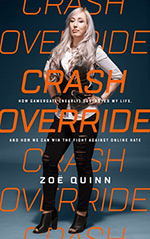
![]() illegible_scribble
illegible_scribble
1/28/2019
![]()
This is a fast, absorbing read. Do not expect it to be a deeply-detailed memoir. Part of it details what she went through with G*merGate, and the online and real-life abuse to which she (and her family members, and her friends, and anyone who had ever been seen exchanging two words with her) was subjected, and how she managed to cope with it enough to survive, however precariously. Part of it describes ways in which you can pre-emptively protect yourself from doxxing and abuse -- and then how to deal with abuse if it happens. And part of it details how to support people who are being abused, depending on how well you know them (especially if you don't know them personally). There are some things in that last section which readers may find surprising.
Quinn is an extremely thoughtful (in the "giving the issues deep consideration and providing insightful analysis" sense) person, and an incredibly articulate writer. A lot of what she says made me reconsider some of my personal perceptions about how abuse occurs, and how it should be handled. Part of her stance is that it should always be approached in terms of bad behaviors rather than bad people -- but that the abuser may or may not be susceptible to seeing the light and changing their ways, so the emphasis should always be on what best helps the targets to survive and heal.
Quinn is pretty open and honest about her own flaws and bad behaviors -- both past and present -- and the acknowledgment that we all are part of the problem, and therefore need to work to be part of the solution. She openly acknowledges that her own experience is one of white privilege, and cautions against taking her experiences as representative of those faced by other women, POC, LGBTQ, mentally- and physically-disabled, and other marginalized persons; reading her book is only one step toward understanding and combatting online abuse, not an end in itself. She provides suggestions of other people whose writings are a good start in understanding other perspectives. And she is adamant that the response to hate campaigns and doxxing should not be to engage in the same techniques against the abusers.
I was not aware that in the wake of her abuse she had created the Crash Override Network, which includes an online website with resources to help people who are being abused, and a staff of volunteers with credentials and experience in assisting people who are trying to navigate the results of campaigns of abuse. This is a tremendous resource, one which should be signal-boosted. It was unsurprising, but disheartening, to find out just how little willingness big corporations like Twitter, Facebook, Reddit, Google, etc. have demonstrated to combat abuse, versus their zeal for combatting copyright infringement of big media company properties.
I would recommend this book to anyone who has been a target of online abuse, who wants to protect themselves online, or who wants to be an ally to those who have been / are being abused. It is almost certainly going to be on my Hugo ballot for Best Related Work.